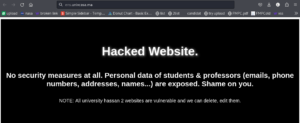🛑 What Is the CNSS and Why Was It Targeted?
The Caisse Nationale de Sécurité Sociale (CNSS) is Morocco’s national social security fund. It plays a vital role in collecting, storing, and managing sensitive data for millions of Moroccan employees and companies.

In April 2025, the CNSS Hack marked one of the most severe data breaches in Morocco’s digital history. A hacker group — allegedly of Algerian origin — breached CNSS systems and leaked massive amounts of private data on public forums and Telegram channels.
🔓 What Data Was Exposed in the CNSS Hack?
The data breach includes:
- Personal data of millions of registered workers: full names, national ID numbers, declared salaries (some exceeding 1 million MAD/month), job titles, and social security declarations.
- Company information: names of Moroccan businesses, addresses, managers, email addresses (including accountants’), bank account details, and current business status.
- Monthly declarations submitted to CNSS for each employee.
To this day, a large portion of the leaked data remains publicly accessible.
⚠️ Risks and Consequences of the CNSS Hack
The CNSS Hack is not only a breach of privacy — it introduces serious cybersecurity and economic threats:
Legal ramifications: CNSS and the government could face lawsuits from affected individuals or international bodies.
Extortion: Threat actors can use leaked financial or employment data to blackmail individuals or companies.
Phishing attacks: Hackers can craft highly convincing fake emails or websites using leaked info.
Industrial espionage: Competitors can estimate a company’s value based on staff size and salaries.
Dark web trade: Leaked databases may be sold, increasing identity theft and financial fraud risks.
Loss of public trust: Citizens and companies may grow skeptical of digital services and government platforms.
🧠 Root Causes: Why Did the CNSS Hack Happen?
While full details are still under investigation, cybersecurity experts believe the following gaps contributed to the CNSS Hack:
- Outdated systems: Many public websites in Morocco use old software with known vulnerabilities.
- Lack of MFA (Multi-Factor Authentication): Critical administrative systems may have lacked basic login protection.
- No real-time monitoring: Without threat detection tools, attackers had time to move laterally and exfiltrate massive datasets.
- Weak internal security policies: Human error, poor password hygiene, or social engineering could have enabled access.
- Absence of an incident response plan: Delayed response allowed attackers to maximize damage.
🏛️ National Impact and Long-Term Fallout
The CNSS Hack may reshape Morocco’s digital strategy in several ways:
Judicial and international pressure: Morocco may face regulatory scrutiny over how data is handled and protected.
Increased resistance to digital transformation: Businesses and individuals may hesitate to adopt online services.
Doubt over the Digital Dirham (e-dirham): Trust in digital money could suffer if institutions can’t even protect payroll data.
Potential return to paper-based processes due to rising fears about cybersecurity.
Diplomatic tensions: The alleged Algerian origin of the attack could escalate regional conflicts — or push for dialogue.
Boost in cybersecurity demand: Moroccan public and private sectors will likely invest heavily in cybersecurity solutions.
🛠️ How Morocco Must Respond After the CNSS Hack
To prevent future breaches and restore trust, Morocco must prioritize cybersecurity reform:
Launch public awareness campaigns to teach citizens how to recognize and respond to phishing and fraud.
Perform national security audits across all public and semi-public institutions.
Implement mandatory MFA and user access controls.
Update and patch vulnerable systems regularly.
Deploy real-time security monitoring and intrusion detection.
Train all government staff in security best practices.
Create a national incident response center capable of managing attacks quickly and transparently.
Final Thoughts
The CNSS Hack is a defining moment in Morocco’s digital journey. It shows that without robust cybersecurity, digital progress can be instantly reversed. While the scale of this breach is alarming, it also presents a unique opportunity to reform and rebuild stronger, safer systems.
The road to secure digital governance starts here — and it starts with taking cybersecurity seriously at every level.





